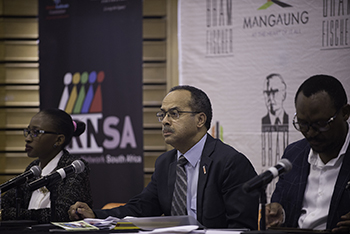Latest News Archive
Please select Category, Year, and then Month to display items
08 April 2021
|
Story Thabo Kessah
|
Photo UFS Photo Archive
 Dr KPD Maphalla with former UFS Chancellor, Dr Franklin Sonn, during the graduations in April 2007.
Dr KPD Maphalla with former UFS Chancellor, Dr Franklin Sonn, during the graduations in April 2007.
The University of the Free State is sad to learn of the passing of alumnus and award-winning Sesotho literary giant, Dr KPD Maphalla.
The literary works of Dr Khotso Pieter David Maphalla, like many other African writers and artists, were influenced and characterised by his own era of powerful forms of oppression and exclusion from dominant literary discourses. In his own right and through his writings of poetry, novels, short stories, and kodiamalla (dirge), he articulated a deliberate political and social protest and pushed for a place for African languages in literature at the height of apartheid.
“He entered the professional scene with his ground-breaking novel, Kabelwamanong, in 1982 at the age of 27. His career actually started in 1971 while he was still at school. Since his first novel, he has produced at least two books annually, covering the genres of poetry, novels, dramas, and short stories. As a dramatist, Dr Maphalla has written a number of excellent and educative radio dramas for the then Radio Sesotho (now Lesedi FM),” said his long-time friend and Head: African Languages at the University of the Free State, Dr Nyefolo Malete.
“It was for this writing prowess that he received recognition from the UFS when he was awarded an Honorary Doctorate in Literature by the Department of African Languages during a momentous ceremony on the Qwaqwa Campus in 2007,” added Dr Malete.
Dr Malete also revealed that, despite losing the use of his right hand after suffering a stroke following a car accident in the late 1990s, Dr Maphalla continued writing using his left hand. “He was adamant that, what he referred to as his ‘supposed disability’, would not deter his passion for writing.”
Dr Maphalla’s work has also produced numerous scholarly studies by the likes of Profs Moleleki Moleleki (protest poetry), Thapelo Selepe (lament and protest poetry), and Dr Seema Seema (process of cross-cultural communication). He was a committed Qwaqwa community member, who was also instrumental in the founding of Qwaqwa Community Radio (2000) and Metjodi Writers (2006), among others. He has written more than 70 books, many of which have been prescribed texts in schools.
Some of the awards he has won include:
South African Centre for Digital Language Resource (SADiLar) Sesotho Lexicographic Unit (Sesiu sa Sesotho) Lifetime Award for outstanding literary works and for promoting Sesotho literature (2019).
The Literature Festival and the University of the Free State Award for enormous contribution to Sesotho literature by a South African writer (2019).
Lifetime Achiever Award in Literature awarded by the Department of Arts and Culture (2005).
M-Net Book Prize for Sesotho poetry (2005). The first and thus far the only Sesotho author to have received this honour.
M-Net Book Prize for best novel (1996).
De Jager-HAUM Literary Award for his volume of short stories, Mohlomong Hosane (1993).
Thomas Mofolo Trophy for Best Novel, Best Poetry, and the Overall Award (1992).
Thomas Mofolo Trophy for Best Poetry (1991).
Dr JJ Moiloa Floating Trophy for Best Sesotho Poetry Book of the Year, Kgapa tsa ka (1985).
Anti-Racism Network South Africa launched in Free State
2016-04-19
 Ms Nokuthula Sithole, Dr Danny Titus, and Mr Qondile Khedama
Photo: Lihlumelo Toyana |
“Racism is, and has been, alive among us as the people of South Africa for a long time, and we therefore need organisations such as ARNSA to create spaces for us to speak up on issues of racism.” The Executive Mayor of the Mangaung Metro Municipality, Counsellor Thabo Manyoni, urged South Africans and the people of the local Metro to speak up on issues relevant to racism. He was speaking at the launch of the Free State chapter of the Anti-racism Network of South Africa (ARNSA) in Bloemfontein.
The Institute for Reconciliation and Social Justice (IRSJ) at the University of the Free State (UFS) is partnered in this endeavour by the Mangaung Metro Municipality, the Ahmed Kathrada Foundation, the Foundation for Human Rights, the Nelson Mandela Foundation, Churches against Racism in Southern Africa (CARS) and the Department of Justice and Constitutional Development.
The ARNSA launch was followed by a dialogue led by Dr Danny Titus, Mr Qondile Khedama, and Prof Christina Landman. JC van der Merwe, the Deputy Director of the IRSJ at the UFS, said that the ARNSA initiative has the potential to unite all South Africans in appreciating and respecting the humanity of all people, as well as to mobilise people to fight against racism. His sentiments were echoed by Sean Moodley, the national ARNSA coordinator. Moodley said that we all have to take on racism; to learn about it, speak out against it, and act to stop it.